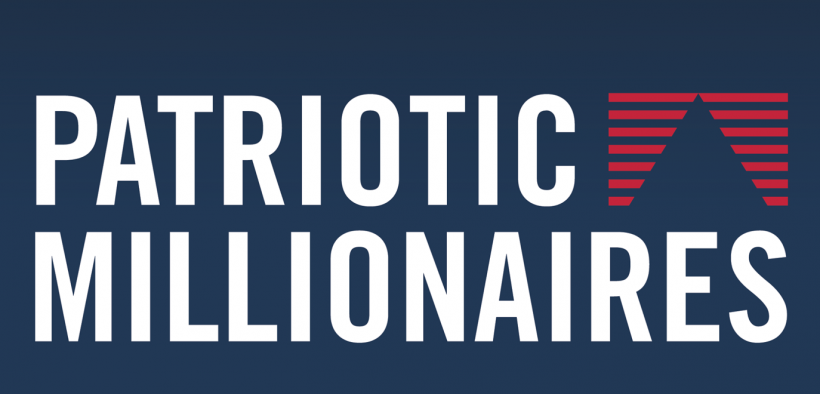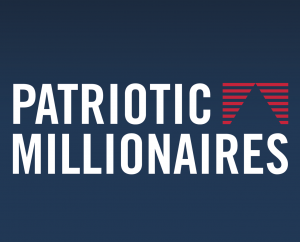‘Tax the Rich!’ Say These “Patriotic Millionaires’

Once upon a time—way back in the 1950s and ‘60s—the wealthiest Americans paid a top tax rate of over 90%. Now, the top tax rate is 43%, but many of the richest Americans use a variety of techniques to pay much less.

In recent years, Warren Buffet and Jeff Bezos paid tax rates of less than 1%, according to a ProPublica investigation into five years of IRS data. In interviews over the years, Buffet has complained that his secretary has a higher tax rate than he does.
Many of the rich want things to stay just the way they are, but a group called Patriotic Millionaires says the rich should pay their fair share to help reduce rapidly-rising economic disparities.
The group, which now has around 250 members, skews liberal, but includes conservative Republicans. Some members say their Christian faith is a major factor in their counter-intuitive crusade to seemingly work against their own economic interests by seeking to increase their own tax burden.
“It’s a wonderful thing to be rich and successful,” said health care executive John Driscoll, who was raised Catholic and now attends Catholic, Protestant, and Episcopal churches in New York. “But it will still be wonderful to be rich and successful when taxes go to a fairer place. We will be a better and more just society if we can pay our bills as a country and feed the poor.”
Bob Burnett is a Quaker who worked at IBM before making his millions as a founding vice president at Cisco Systems.
“I believe that the Holy Spirit gives us gifts,” he says, including the musical gifts he employs at his unprogrammed Quaker meeting in California. “I’ve come to regard my wealth as a gift. It’s something I’m the steward of. But we don’t have a level playing field now. Things are tilted way in favor of the wealthy, and that’s not good for democracy.”
Founded in 2010 by a Democratic operative, Patriotic Millionaires is an advocacy and lobbying group that fights for “tax fairness” and reducing disparities through such measures as a higher minimum wage, but it doesn’t take a stance on government spending, said spokesman Sam Quigley.
The group’s impact is changing the national narrative. “We’re really excited to see how some ideas around taxation that used to be considered crazy even a few years ago have become much more mainstream,” said Quigley, pointing to recent political debates about a wealth tax and capital gains taxes.
Among the group’s more prominent members is Abigail Disney, granddaughter of Walt’s brother Roy. She says many wealthy people are so isolated from normal people by their “private planes and the bottle service in the back and the limousines with the tinted windows” that they don’t see the suffering that millions of poor people endure, including janitors at Disneyland who asked her to help them make a living wage.
Access to MinistryWatch content is free. However, we hope you will support our work with your prayers and financial gifts. To make a donation, click here.
For John Driscoll, who grew up Irish Catholic in Massachusetts, joining Patriotic Millionaires is part of a life-long quest to apply his faith to the problems of the poor—a quest that included hosting a homeless man in his college apartment when there was no place else that would take him.
“That was foundational for me,” he said. “I realized the system doesn’t really work for the poor. We have a broken social contract, and a tattered safety net that only partially works.”
He would later volunteer for a Catholic Worker soup kitchen, develop housing programs for the homeless families, and work with the Alliance to End Hunger, Outward Bound, and Bread for the World.
“For me, the promise of America is that everybody has a shot, not just those who are the lucky sperm club,” said the CEO of CareCentrix and former CEO of Medco. “I see it as an American obligation to protect the American dream.”
Driscoll believes in private charity, but says it’s nowhere near enough to provide what’s needed. “Ninety percent of all food assistance in America comes from the government,” he says, “but $4 a day is not enough to feed a healthy child or parent. If federal and state governments can’t pay their bills during a time of the greatest wealth creation in the U.S, we can afford to pay more taxes to feed and house the poor.”
For Quaker Bob Burnett, a stint working as a probation officer in Orange County, Calif. opened his eyes to inequality. He didn’t forget that lesson as he grew increasingly wealthy. “Once you become a millionaire, you really do understand that there’s a whole set of privileges that go with being wealthy.”
He says the democracy suffers when money talks in politics at the expense of the voices of the poor. “If you’re juggling a couple of jobs, you don’t have the time to be an informed citizen,” he says.
Income Inequality vs. Class Mobility
Ending income inequality seems to be a major focus of Patriotic Millionaires. They and their advocates sometimes quote a study by the relief organization Oxfam saying the 85 richest people in the world are as wealthy as the poorest half of the world’s population.
But is income inequality really bad? Would ending income inequality—even if that were possible—really eliminate poverty? A growing body of evidence suggests the answer to both these questions is “no.”
The real issue is not inequality, per se, but mobility: What chance does a poor person have of moving up the economic ladder? What economic and social conditions are most likely to increase that upward mobility? The Equality of Opportunity Project at Harvard and Berkeley—two institutions not known for their conservative ideas—suggests that income inequality plays almost no role in increasing or decreasing income mobility.
Over a 30-year period, when income inequality has moved up and down, mobility has remained more or less constant, and has virtually no correlation to the tax code.
Raj Chetty, a Harvard economist and principal investigator at the Equality of Opportunity Project, calls this both good news and bad news. The good news is that increased income inequality hasn’t hurt mobility. The bad news is that mobility has not increased during that time. He asserts that the “single strongest correlate of upward mobility” is family structure and what his study calls “community religiosity.”
Bradford Wilcox, who leads the National Marriage Project at the University of Virginia said “inequality itself is not a particularly potent predictor of economic mobility.” Wilcox studied the Harvard and Berkeley data and concluded that “high percentages of two-parent families, and high local government spending—which may be a proxy for good schools—are the most likely to help poor children relive the Horatio Alger story.”
A series of studies on the gentrification of neighborhoods further debunks the idea that rich people getting richer is the cause of poor people getting poorer. One study, from the Cleveland Federal Reserve Bank, asked whether affluent people moving into a neighborhood forced the poor out. The study concluded that “gentrifying neighborhoods may be a boon to longtime residents as well.” Poor neighborhoods are already transient. They are displaced not by more affluent people, but by a lack of opportunity in those neighborhoods.
When rich people move into poor neighborhoods, they bring their money and opportunities with them. It turns out that all those affluent yuppies, Gen-Xers, and millennials support local businesses, volunteer in the community, and generally do things that help their poorer neighbors. They start businesses and hire long-time residents. In short, the income of the rich really does “trickle down,” or at least out, to the poor in those same neighborhoods. According to the Cleveland Fed study, all this economic activity makes the poor actually more likely, not less likely, to be able to stay in their neighborhoods.
Of course, not all wealth is created equally. A technology entrepreneur who creates an industry and becomes a billionaire in the process is different from a despot who throws slave labor into a diamond mine in a developing country. But Bob Lupton, author of Toxic Charity and someone who has devoted his life to helping the poor, said “we don’t do enough to celebrate the wealth creators of the world.” He said someone like Bill Gates “may have a net worth that puts him among the richest in the world, but his wealth is just a small fraction of the total wealth he has created.”
Lupton goes so far as to say that “wealth creation can be a spiritual gift. God gives people certain abilities to create wealth. It can be a wellspring out of which shalom can emerge. Wealth creators play an essential role … in a healthy society and a just world.”
Warren Smith contributed to this article.



